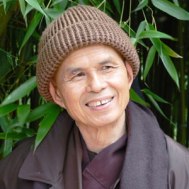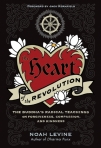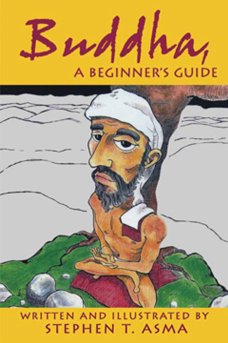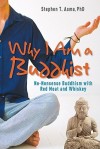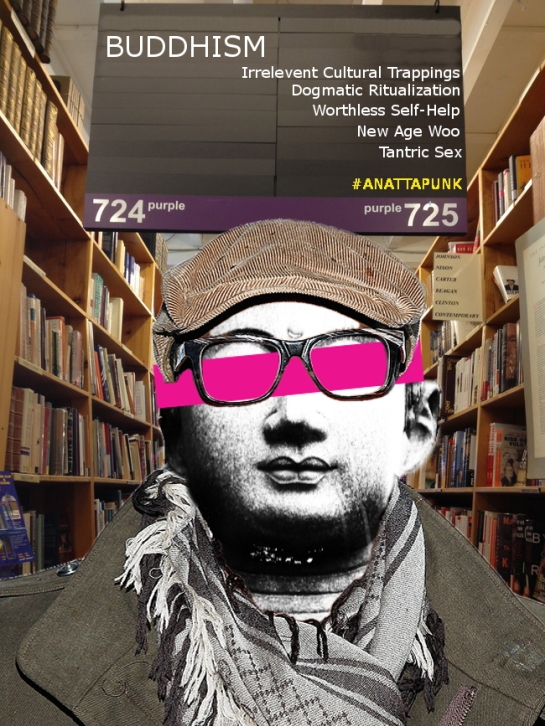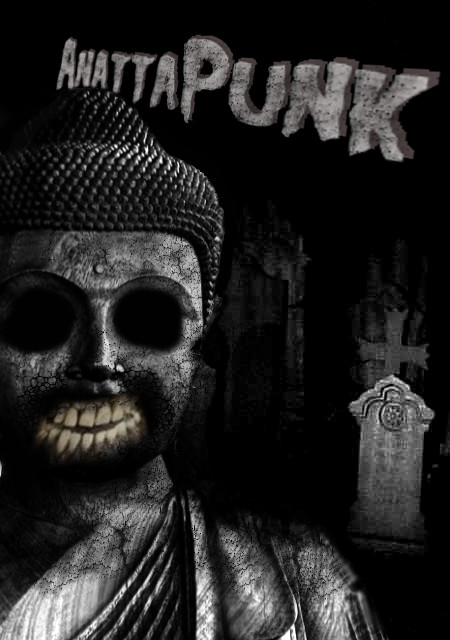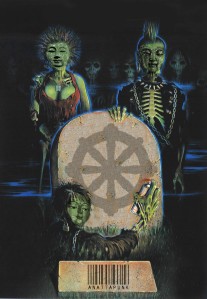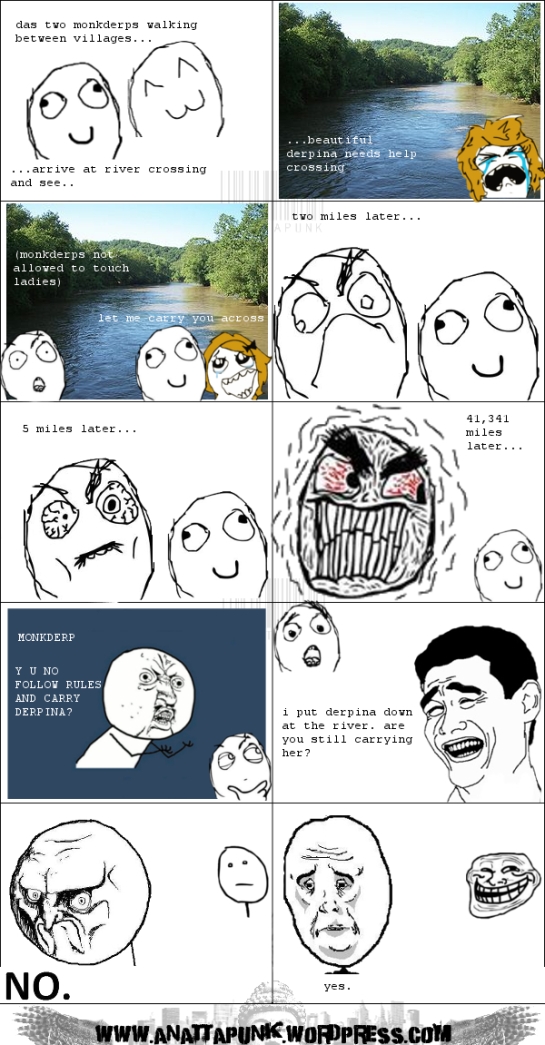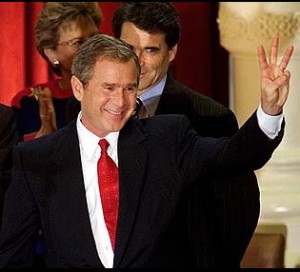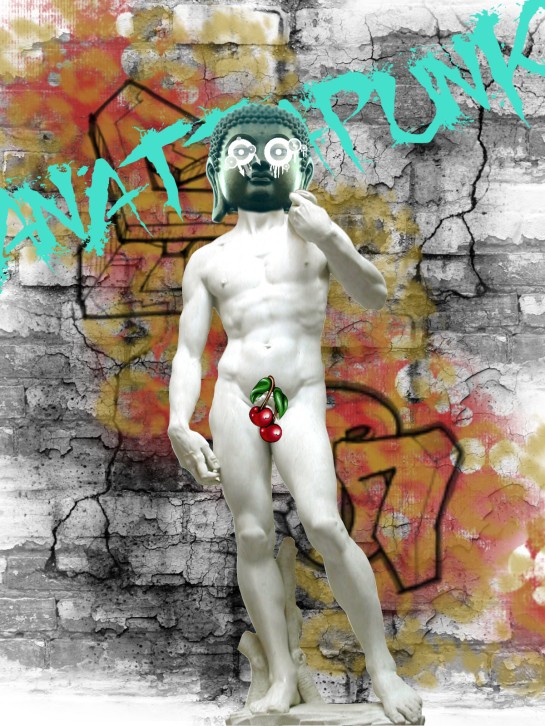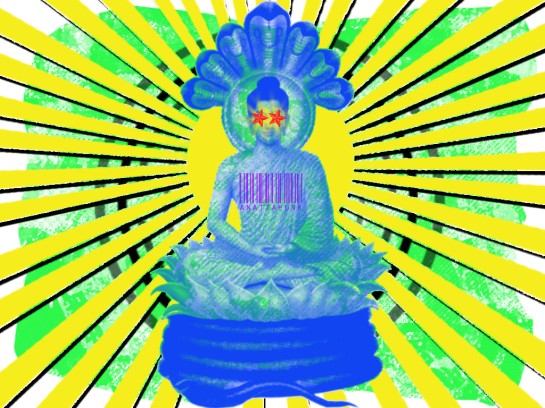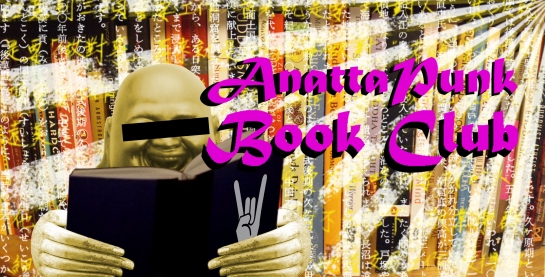 If you followed our advice last time around you’ve got a new found understanding of Buddhist basics. So now what? Like a fine restaurant, AnattaPunk is offering you a wide selection of gourmet dishes for your second course. In other words, I can’t make up my mind. I’ve got three titles in my hat but I’ll leave it up to you to decide which one sounds most likely to stimulate your own interests. Secular Buddhism is about taking responsibility for your own life and making the most of it, so take your pick: The Miracle of Mindfulness by Thich Nhat Hanh, Sit Down and Shut Up by Brad Warner, or The Heart of the Revolution by Noah Levine.
If you followed our advice last time around you’ve got a new found understanding of Buddhist basics. So now what? Like a fine restaurant, AnattaPunk is offering you a wide selection of gourmet dishes for your second course. In other words, I can’t make up my mind. I’ve got three titles in my hat but I’ll leave it up to you to decide which one sounds most likely to stimulate your own interests. Secular Buddhism is about taking responsibility for your own life and making the most of it, so take your pick: The Miracle of Mindfulness by Thich Nhat Hanh, Sit Down and Shut Up by Brad Warner, or The Heart of the Revolution by Noah Levine.
The Miracle of Mindfulness: An Introduction to the Practice of Meditation. There are a variety of styles and traditions when it comes to meditation. I think basic mindfulness is the easiest to understand in concept and to start practicing. Mindfulness has made its way into the science of psychology as well as pop culture, including January 2014’s Time Magazine cover. Or [this]. It’s practical in the sense that you can learn to practice while doing things you normally do anyway. For example, Hanh discusses mindfulness practices while eating or doing the dishes. One note of caution–AnattaPunk always recommends a skeptical approach when considering new information, and that is especially true with this book. Hanh makes some pretty wild assertions, some downright irresponsible. I’m pretty sure that at one point he says certain breathing practices can cure cancer (?!). But if your B.S. meter is working properly this book is still a quick easy intro to a potentially life-altering practice. Plus you can read this book for free [here]. You don’t need to believe any woo to benefit from mindfulness. When you come across anything that offends your logic and common sense in Hanh’s commentary, just remember what Stephen Batchelor said (more where this came from in Part 3):
“[Mindfulness] is not concerned with anything transcendent or divine. It serves as an antidote to theism, a cure for sentimental piety, a scalpel for excising the tumor of metaphysical belief.”
Sit Down and Shut Up: Punk Rock Commentaries on Buddha, God, Truth, Sex, Death, and Dogen’s Treasury of the Right Dharma Eye. Brad Warner comes from a Japanese Zen background, not terribly unlike Hanh’s Vietnamese Zen. That doesn’t mean they always agree. Warner is a punk musician turned monster-movie-maker turned Zen priest. This book is both a memoir of these experiences and commentary on the teachings of the 13th century Zen master Dogen. This book will give you insight into Zen-style meditation; i.e. zazen. Zazen is probably what you think of when you hear the word meditation, when you see an image of someone sitting quietly with their legs all pretzeled underneath them. Warner discusses how to do this and why. The “why” is very nuanced and presents a fascinating intellectual puzzle to tinker on. Sit Down and Shut Up was Warner’s second book and my personal favorite, but Hardcore Zen, Zen Wrapped in Karma Dipped in Chocolate, and Sex, Sin, and Zen are also worthwhile reads. Warner would probably not describe himself as a secular Buddhist (or maybe he would based on the title of 2013’s There is No God and He is Always With You. I’m looking forward to reading this one) but his approach is very no-nonsense. In his books and blog posts he often debunks supernatural claims, and his discussions of a very practical, non-supernatural approach to enlightenment should be considered mandatory reading.
The Heart of the Revolution: The Buddha’s Radical Teachings on Forgiveness, Compassion, and Kindness. Did all these guys get together and mandate that all the books on Buddhism in the last few years have to have long subtitles? No matter. Noah Levine is a fascinating dude. One of his previous books, Dharma Punx, is a very frank account of his life as a drugged-up self-destructing nihilistic gutter punk and how meditation practices saved his life. The Heart of the Revolution, however, is more of an instruction manual for meditation techniques on–you guessed it–forgiveness, compassion, and kindness. As a person who readily admits that he’s lied, stolen, committed violence on himself and others, and generally fucked up in every possible way, Levine reminds us all that finding forgiveness and compassion for others is often easier than finding it for ourselves. It’s difficult to write about loving oneself without reeking of cheesy self-help cliche. Levine succeeds for the most part. His other books including Against the Stream are also recommended.
EXTRA CREDIT: Check out The Dhamma Brothers, a documentary film on the effects of Vipassana practice on a group of convicted criminals in an Alabama prison. Vipassana is sort of an intensive mindfulness practice. You may be surprised at what happens to these prisoners, and even more surprised at the prison system’s reaction to the Vipassana program. No spoilers here!
Ok, fellow students. This concludes today’s discussion. Reading one of these in addition to your assignment from Part 1 should be good enough to advance to Part 3. You’ll benefit more from reading all three, but hey, I promised I’d only make you read 3 total. While the above books seem different in their approach or focus, at some point in your studies I think these ideas will all start pointing in the same direction. If they don’t, then take what’s useful for you and move on. More advanced students can feel free to share your own secular Buddhist punk rock reading lists (or playlists) on our Facebook page. Thanks for reading!


